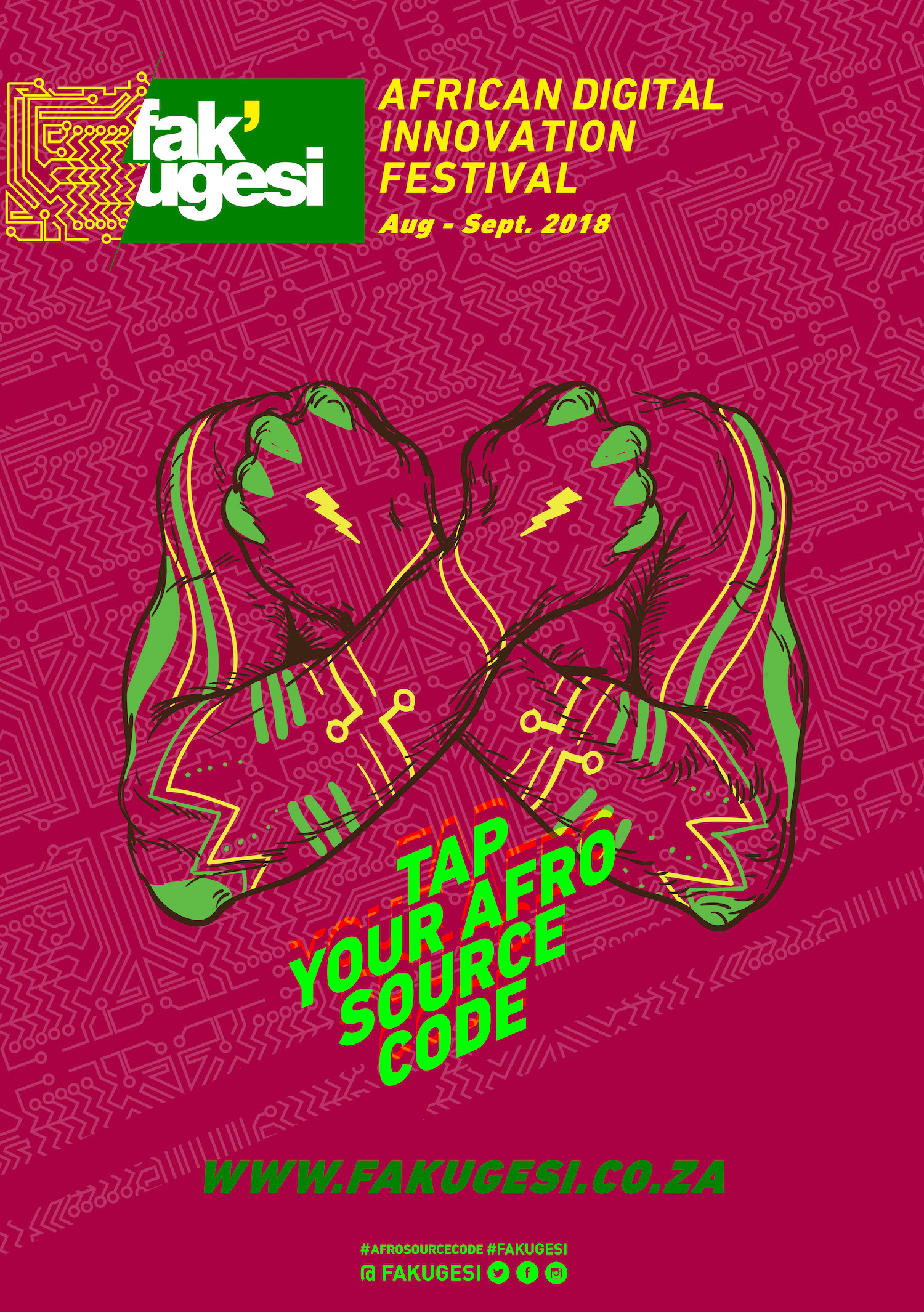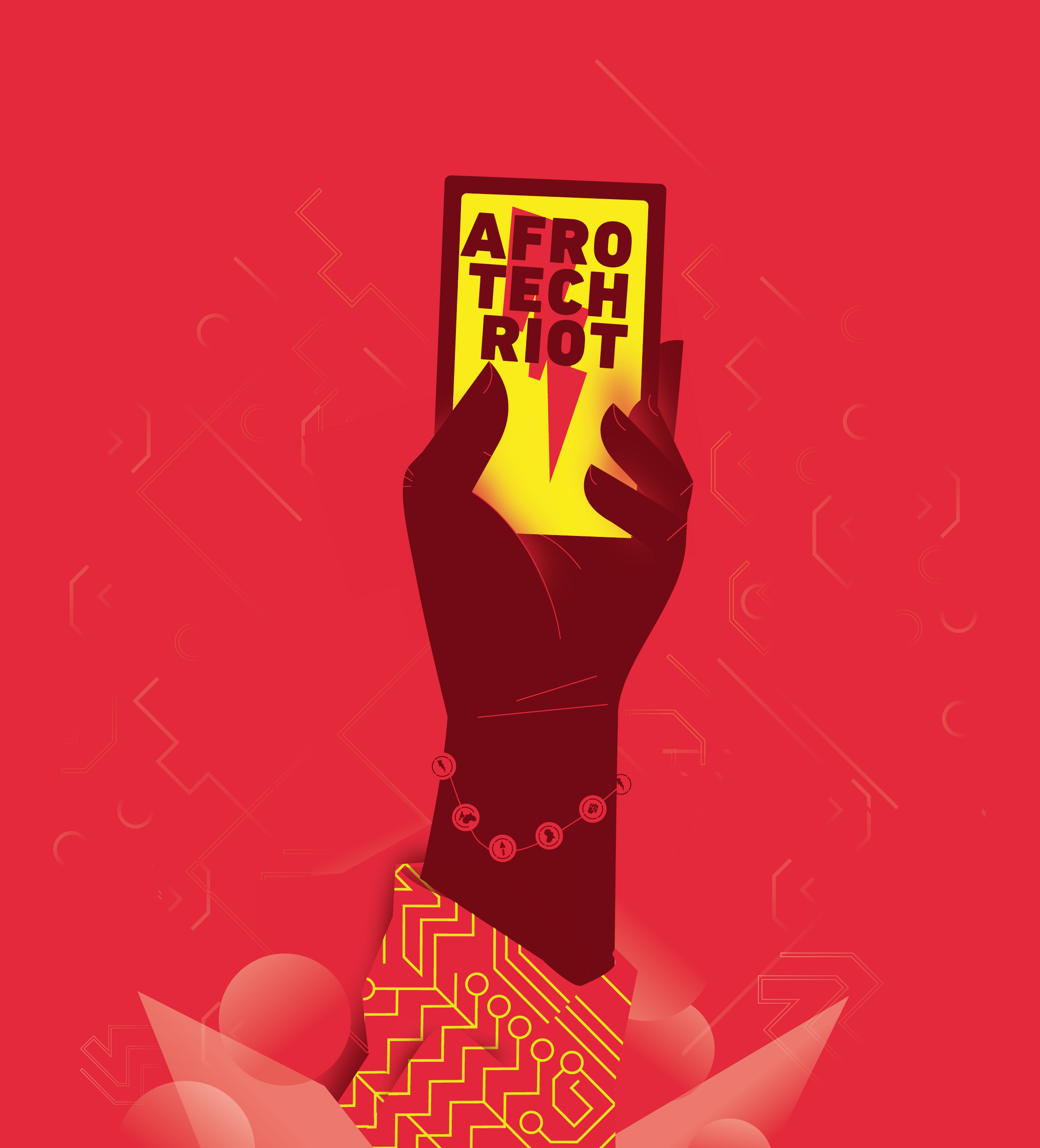The Fak’ugesi African Digital Innovation Festival is generated around collaboration, conversation and projects – for Africans by Africans. An “African celebration of digital technology, art and culture”. Taking place in Johannesburg, the festival is gaged towards encouraging not only people in the city but inhabitants of the continent, to embrace their innovative thoughts and creativity and to gear them towards the digital, African visualizations of their city and future imaginaries. This year’s theme, ‘Afro Source Code’ was introduced by the open call for entries to illustrate the 2018 poster, prompting creatives to “tap [their] Afro Source Code” for inventive Afro futurist, tech and African aesthetics inspired illustration concepts. “Ungaphthelwa Innovation Yako” / “Own Your Innovation”.
The winner of this year’s illustration competition, Sonwabo Valashiya‘s design took its influence from the popular Marvel Afro futurist release, Black Panther. Connecting the vision of the film with that of the festival, Sonwabo explains that both act to spotlight Africa as an innovation hub and thought leader. African creativity, ingenuity and innovation are articulated in illustration.
The “Wakanda forever!” salute from the film was the driving force for the visual actualization of Sonwabo’s design, taking this symbol as a means of expressing the theme of the festival this year.
“This poster also speaks to how Africa is rich in all these “sources” of wealth and how the world feeds off these resources, this notion is also found on Black Panther as they use Vibranium as a “source” to create their weapons and all their innovations but they have to fight to keep their Afro Source Code – (the vibranium) a secret from the world.” Sonwabo expresses.
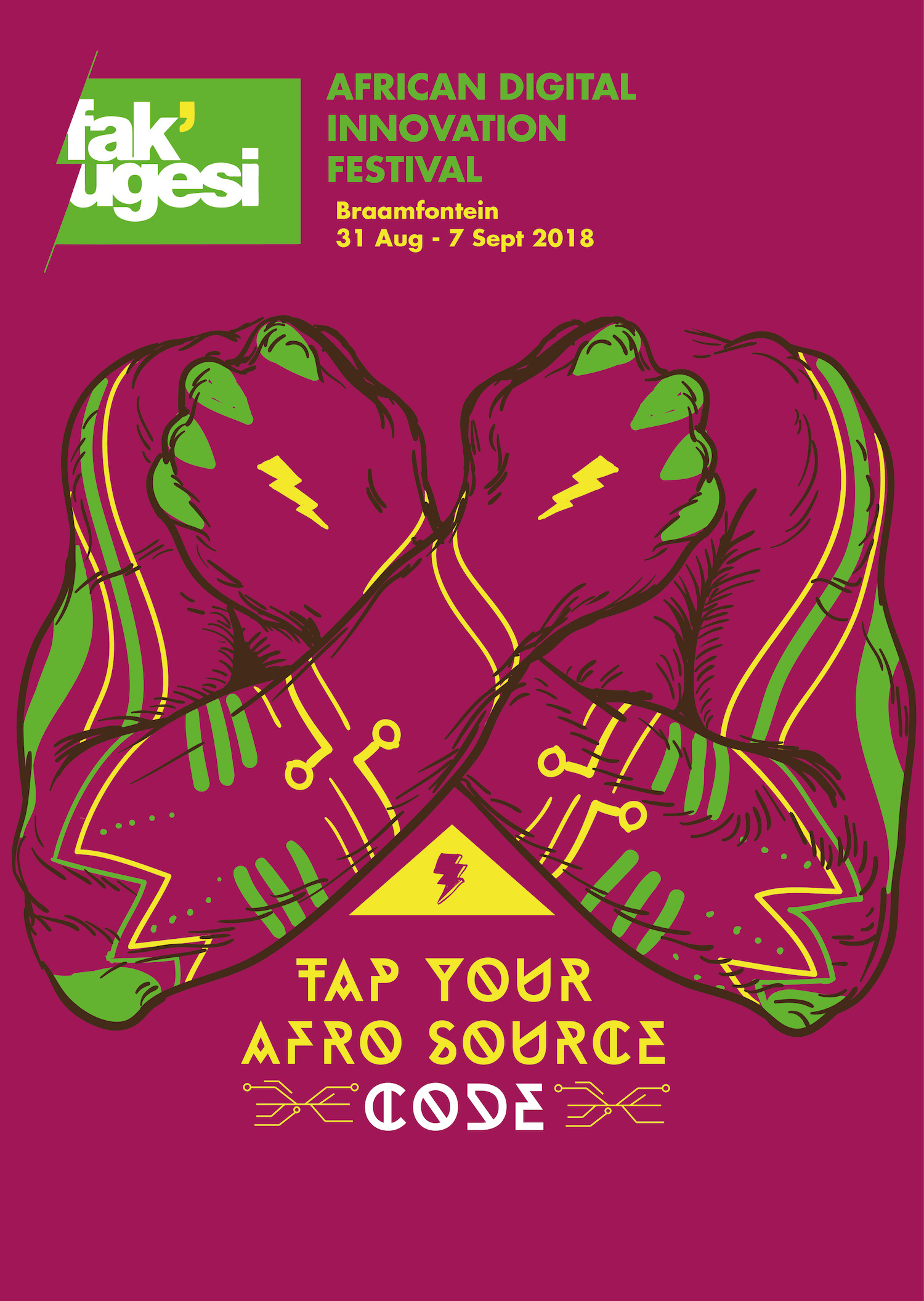
Growing up in Sterkspruit in the Eastern Cape, Sonwabo is a Graphic Designer by profession with a passion for illustration. He completed his studies in Visual Communication at the Tshwane University of Technology. Influenced by his cultural heritage and identity, Sonwabo’s work is a celebration of African aesthetics, Afro Futurism and the diversity of African cultures.
Sonwabo’s participation in the competition was motivated by the interactivity of the festival and the amalgamation of various disciplines under a single umbrella. He further articulates that collaboration with the intent of sparking innovation and critical thinking around solutions to existing socio-economic issues on the continent, a focus of the festival, is of importance to him.
Seeing the competition announcement ignited his interest to participate in the challenge. “…the three key words that caught my eye were Futuristic, African aesthetics and illustration.”
With the already existing direction provided by the brief, such as, “add hands and the traditional lightning bolt icon”– identifiers of the Fak’ugesi brand, Sonwabo set out to create an Afro Futuristic poster design. “I wanted to create something that is relatable and that is a true representation of African beauty and power.” Sonwabo shares.
With a given colour palette stipulated in the brief, Sonwabo added dark brown outlines to his illustration, representative of the rich melanin skin tone of Africans as well as to provide contrast to his completed design. Iconography inspired by technology. The iconic Fak’ugesi lightning bolt, a symbol of power and light are met with shapes mimicking a circuit board. It is visually expressed as African body art patterns in Sonwabo’s design.
On his illustrative use of the circuit board and body art markings Sonwabo states that, “I drew inspiration from the armour of Black Panther and added some of the line and dot patterns that I think can be traced from a couple of African Tribes like Mursi Tribe of the Omo Valley in Ethiopia and the Igbo tribe of Nigeria. However, the whole design of the patterns was meant to be like the lines on a circuit board to represent the pathway of energy and to play on the technology and futuristic concept for Fak’ugesi.”
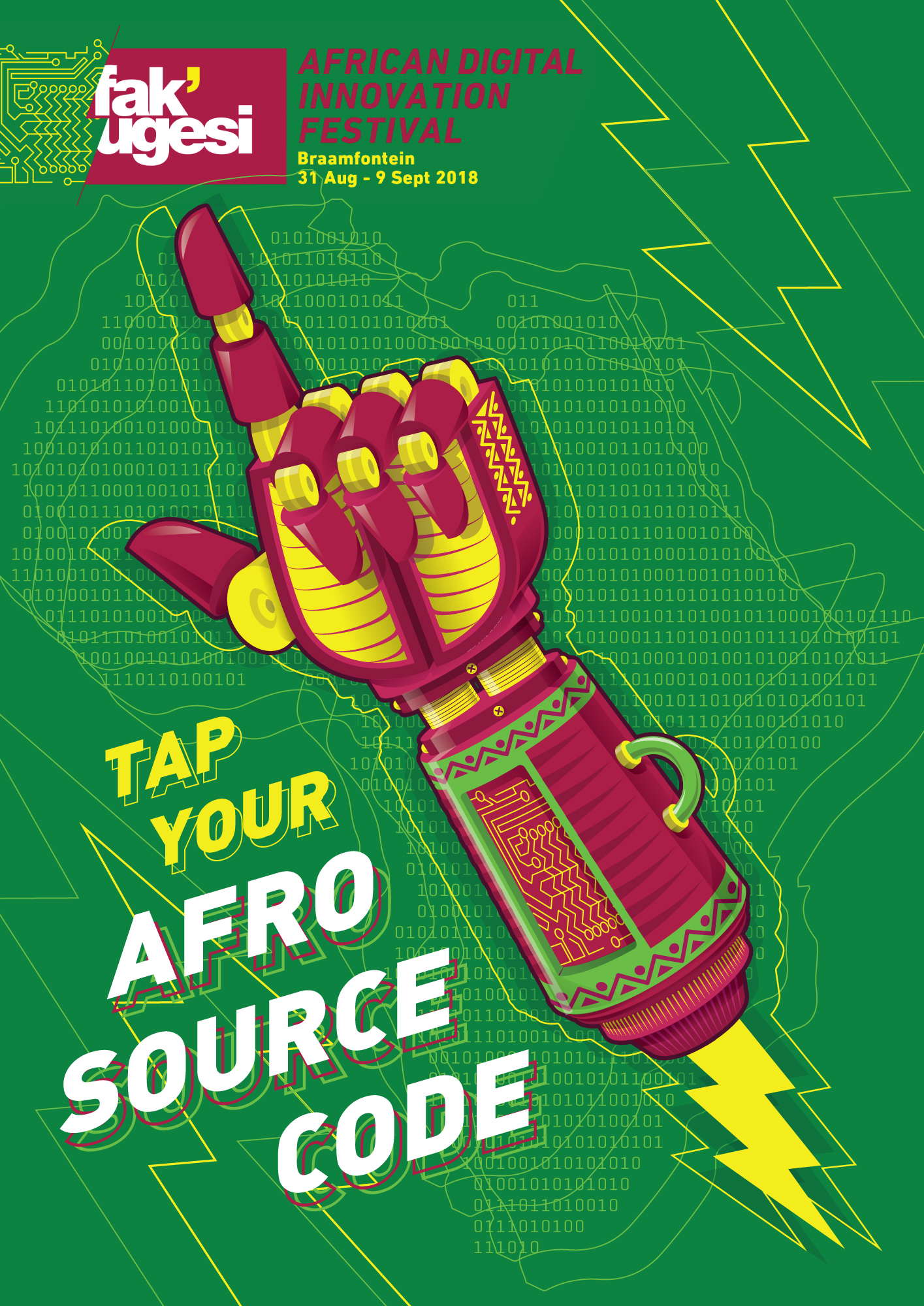
Runner-up in this year’s competition, Shayne Capazorio‘s design took its inspiration from science fiction, comic books as well as intricate African patterns – “combining elements from the past and remixing them to move forward into the digital future.”
Shayne is a Graphic Designer by profession taking on the city of Joburg and its inhabitants as his muse. He completed his studies at TUKS and shares that, “I’m inspired by South African pop culture and I like to incorporate Jozi’s eclectic flavours in my work – bold, colourful, loud, dangerous & strange.”
Holding the belief that Africa is the future, Shayne has become captivated by Afrofuturism in recent times, inspired by the genre to create his own series of robotic characters that take influence from African aesthetics drawn from a future imagining of Mzansi. Shayne’s motivation to participate in the illustration competition was prompted by the concept of African innovation that he feels aligns with his own Afro futuristic vision.
A digital line illustration of a robotic rocket hand blasting into the future. A representation of progress and ingenuity. Robotics used as a signifier of the tech festival. Execution implemented with Afrocentric sensibilities. The African continent becomes a background element in the design, shaped through the use of binary code and speaks to the festival theme, Afro Source Code. With the use of overlapping vector layers, Shayne was able to construct a digital imitation (his illustration) of dynamic movement evocative of the early millennium digital wireframe aesthetic of computing.
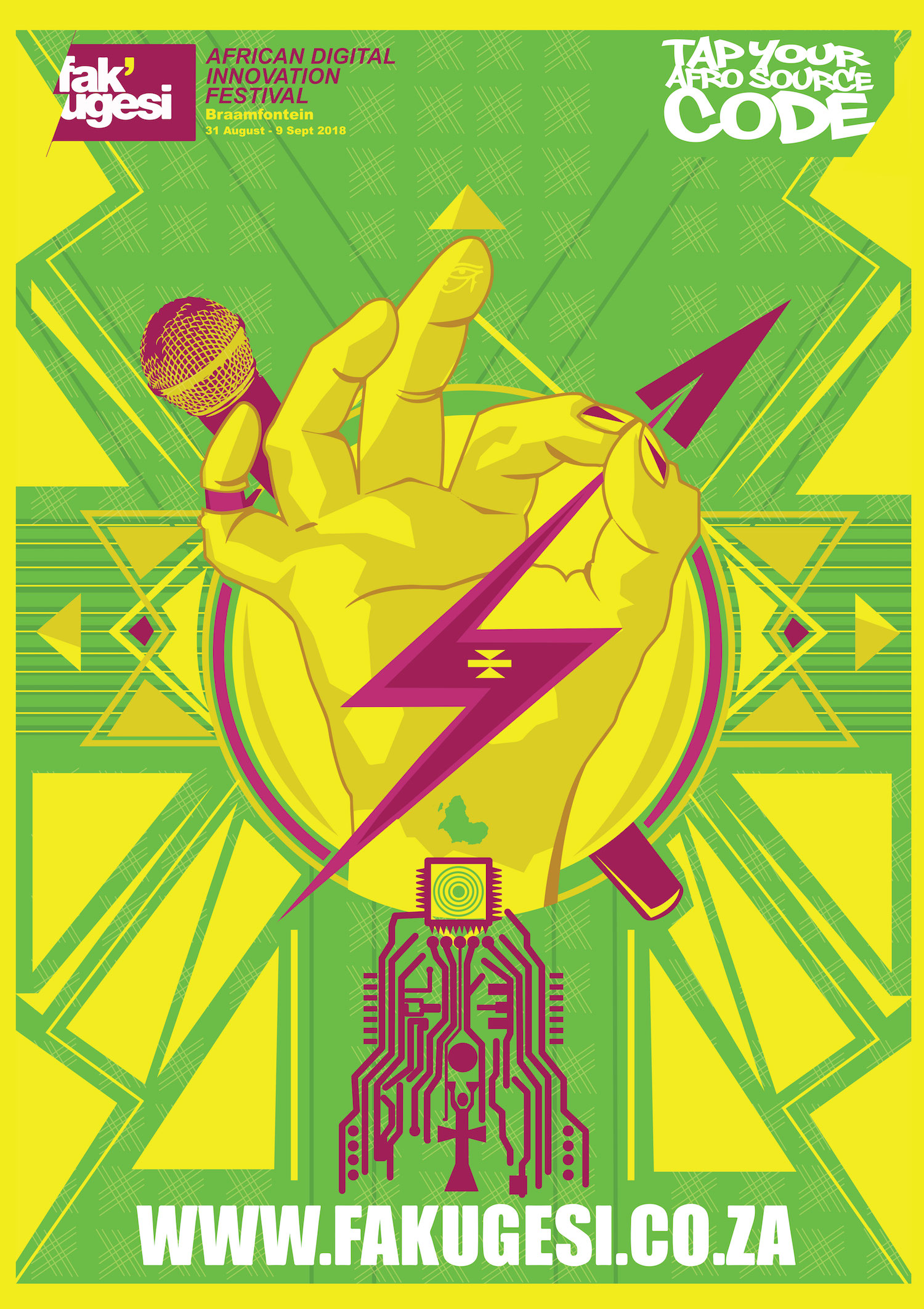
Runner-up Lwazi Gwijane considers himself to be a Creative Designer and completed his studies at Vega in Durban. Becoming interested in the festival identity and the overall activities of the festival in 2017, he decided to enter the illustration competition this year to take part in an experience and an aesthetic that appealed to his sensibilities.
Inspired by Africa he looked to the past of the continent in order to shape an illustrative design of a technological future. “I looked into the past e.g ancient Kemetic which was ruled by Africans which is currently called Egypt today because of years of invasions from Rome, Greece, Arabia. I then placed myself in current day South Africa so to tap into my Afro source which allowed me to be able to imagine a creative Afro future.”
Lwazi’s design takes yellow as it’s overarching colour and he explains that though the colour pallet was provided by the competition brief, he chose to bring yellow to the fore as it is his favourite colour. Unpacking his design, Lwazi states that the hand in his design takes precedence because humans use their hands every day. The heru (horus) eye located on the tip of the third finger is symbolic to the gesture of opening yourself to the use of your Third Eye. Music comes into play with his illustration of a microphone suspended mid-air in the back of the digital illustration. He expresses that the arrow is representative of the Afro pathway which Africans must follow. Lastly, the South African flag is combined with the afore mentioned elements to round off his illustration – a visual marker of where the event is taking place.
Clean, minimalist, eye-catching digital illustrations were created by all three of these creatives bringing African innovation, African aesthetics and the voice of the festival to the fore.
